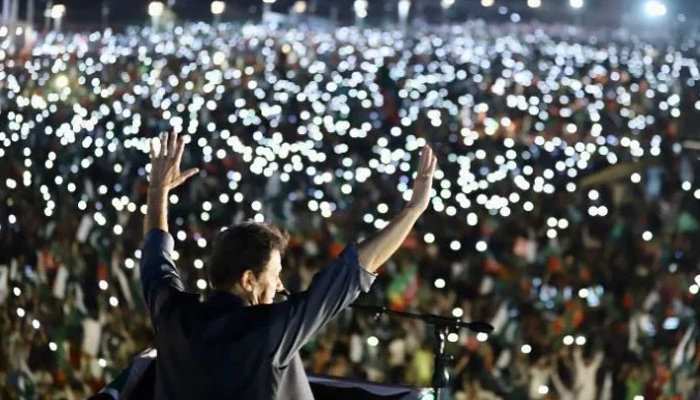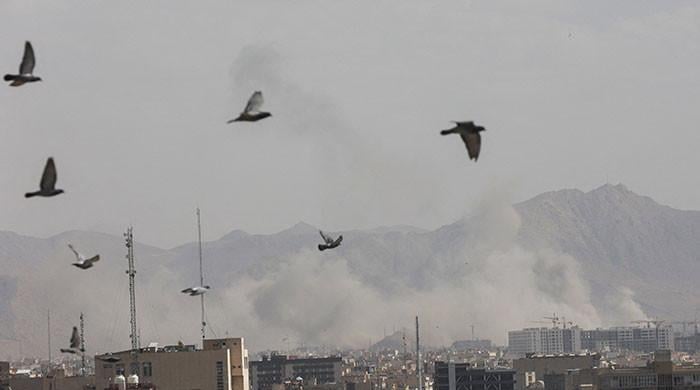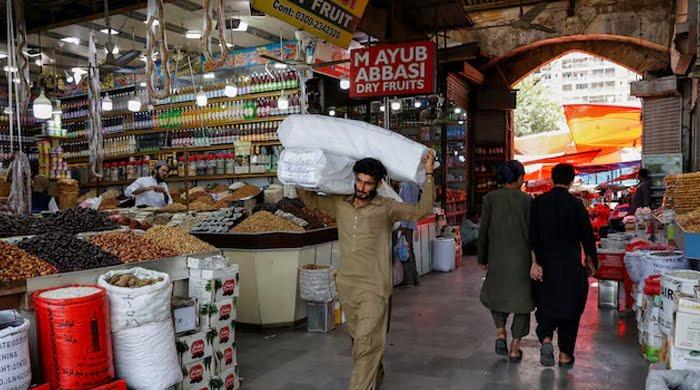Imran Khan's political fallacies
Khan’s critics believe that instead of forming a political party he first created a fan club that was soon converted into a cult
May 23, 2023

After holding a mammoth gathering in Lahore in 2011, former prime minister Imran Khan had created an impression that his party believed in a revolutionary political ideology that would transform not only the political structure of the country but that of society as well. His followers considered him a messiah who could rid the country of the crises it was facing.
It was also claimed that workers and parliamentarians of the PTI would demonstrate unflinching loyalty to Imran Khan in times of crisis. People were told that the party had a strong organisation capable of facing all challenges.
But the recent defections from within the party indicate that all these claims were apocryphal and the party is no different from any other traditional political party of Pakistan that heavily relies on electables and individuals with deep pockets.
During the decade of the 1990s, late Mairaj Mohammad Khan, the former secretary general of the party, had tried to form an organisational structure but Imran Khan’s attitude forced him to abandon the party. Mairaj had an excellent team that could have been instrumental in shaping the structure of the party.
His comrades were ideologically motivated — people who had faced imprisonment, trials and concocted cases in the past but did not leave their parties for the sake of petty interests or monetary considerations. But the PTI chief soon realised these revolutionaries could not serve as his stooges.
It was wrong to assume the Kaptaan wanted any genuine change in society. He rather had a deep interest in coming into power by any means, and was just waiting for an opportunity – which arose after the PPP and PML-N agreed to the Charter of Democracy that united political forces. The country witnessed the first transition of power from a civilian dispensation to another political government.
This is when the idea of a political alternative was conceived, after which powerful stakeholders put their energies into "Project Imran".
The great champion of morality put aside all ethical considerations while welcoming political turncoats and opportunists into his ranks. His shop was open for all types of people — from the religious right to feudals to land grabbers; he greeted every man who knew nothing about political morality.
In addition to that, he also stuffed his party positions with the newly rich who had amassed unimaginable wealth during the time of Gen Musharraf.
Some might be surprised at the defections in Khan’s party but those who have a deeper insight into Pakistani politics knew then that this was a party of ideological charlatans whose shallow slogans of radical change were nothing but a mirage.
It was clear that Khan could not make any positive impact on Pakistani politics. What progressive mission could he have accomplished with the retrogressive elements part of his party? What change could he have brought by siding with and being patronised by the biggest symbol of the status quo in Pakistan?
A political party is supposed to have a proper organisational structure with a central committee or any other policymaking body. A party of change tends to even do better than this by inducting diehard supporters and committed workers into its rank and file. Such a party does not have only a single headquarters in one city; its roots go all the way up to the union council level. Its office bearers — from the UC in charge to the post of secretary general — are elected in fair and transparent elections.
But in the case of the PTI, Justice Wajih Uddin Ahmed, who complained about the use of money and influence during the party’s internal polls, was thrown out. Individuals with deep pockets surrounded Imran Khan from all corners and party positions and tickets were awarded on the basis of wealth and social status.
Those who believe the PTI was/is a party should let people know how many offices it had at the UC, town, tehsil and district levels. How many party bodies were elected in a fair and transparent manner? How many donations were collected by party workers? Would every worker pay some monthly donation or would local MNAs, MPAs and electables invest money into party programmes and events?
Khan’s critics believe that instead of forming a political party he first created a fan club that was soon converted into a cult with brigades of sycophants heaping eulogies on the Kaptaan. When he came to power, he also made efforts to create a pliant media by defanging it but sections of it fiercely resisted preferring to go to jail and face incarceration instead of bowing to the Great Champion of Change.
It was because of this that leader after leader is deserting the PTI because instead of depending on mature political workers he depended on electables, who are now ready to fly to another destination. Even today, he is not making efforts to unite political forces but rather only wants the same special treatment that was accorded to him before the elections of 2018.
A historian once remarked, “History has a lesson for those who want to learn but not for those who want to remain adamant.” It is time Imran Khan reflected upon his unleashing a storm of political revenge, his curbs on the media, his ignoring of human rights violations and his catastrophic plan to bring back the Pakistani Taliban.
He needs to give up the narrative that all politicians believe in sleaze because it is propaganda by forces that want to control all politicians including the Kaptaan. Therefore, his interest lies in allying with political forces, and sorting out differences through dialogues and talks.
If he can appoint Shaikh Rasheed as interior minister, whom he claimed to previously deeply despise, if he can welcome Ghulam Sarwar and other electables, then what is the harm in contacting PPP and N League leaders?
The salvation of the country lies in uniting the political forces that gifted the country with the first constitution, healed the wounds of Pakistanis in the aftermath of the country’s dismemberment, enacted the 18th Amendment and defeated the menace of terrorism between 2008 and 2018. No one is perfect, neither are our politicians. But being a politician, Imran Khan must pin hopes on his fellow political leaders instead of looking elsewhere for relief and salvation. The PDM coalition should also rethink the mass arrest and detention crackdown if it is really interested in uniting political forces.
The writer is a freelance journalist who can be reached at: [email protected]
Disclaimer: The viewpoints expressed in this piece are the writer's own and don't necessarily reflect Geo.tv's editorial policy.
Originally published in The News











